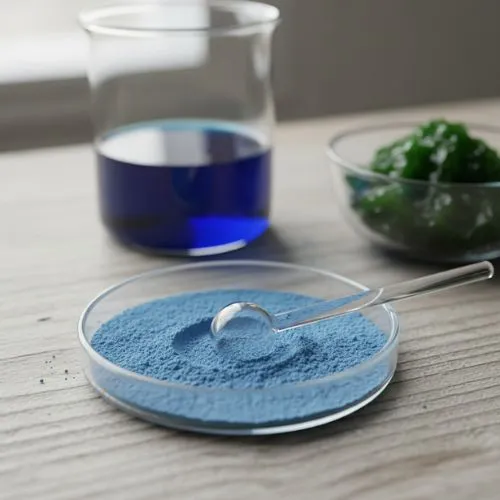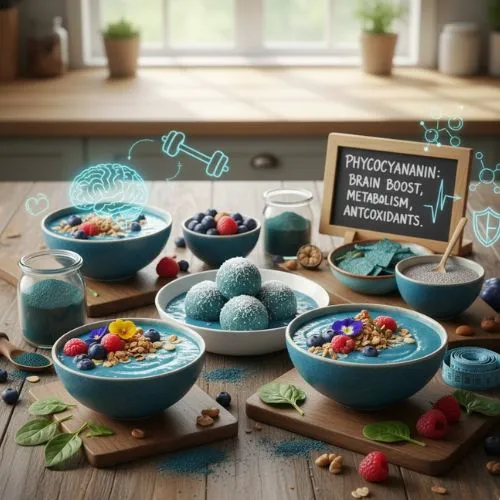What are common food products that use phycocyanin as a coloring agent?
Phycocyanin, a vibrant blue pigment derived from spirulina, has gained significant popularity as a natural food coloring agent. This article explores the diverse range of food products that incorporate phycocyanin, highlighting its versatility and benefits in the food industry.
Phycocyanin in plant-based and vegan foods
Blue-hued dairy alternatives
The plant-based food industry increasingly uses phycocyanin as a natural blue coloring agent in dairy alternatives. Vegan yogurts, ice creams, and milk substitutes feature this pigment to enhance visual appeal and attract consumers. The soft blue hue gives these plant-based products a distinctive, eye-catching look that helps them stand out on store shelves and emphasizes their natural, innovative qualities within the growing vegan market.
Vibrant plant-based cheeses
Phycocyanin has made its mark in vegan cheese production as a natural substitute for synthetic blue dyes. Artisanal plant-based cheesemakers use this vivid pigment to craft striking blue-veined varieties that resemble traditional blue cheeses in both appearance and appeal. Beyond its visual impact, it supports the clean-label movement by providing a naturally derived colorant that aligns with consumer preferences for transparency, minimal processing, and wholesome ingredients in modern food products.
Blue-spirulina smoothie bowls
Health-conscious consumers have enthusiastically embraced the colorful smoothie bowl trend, with phycocyanin taking center stage in creating striking blue versions. These nutrient-rich bowls typically feature a phycocyanin-colored base, beautifully topped with fruits, nuts, and seeds for added texture and flavor. The brilliant blue hue not only enhances visual appeal—making the bowls highly shareable on social media—but also reflects the inclusion of spirulina, celebrated for its protein, antioxidants, and overall nutritional value.

Trending snacks colored with phycocyanin
Blue potato chips and tortilla chips
Snack producers are embracing phycocyanin to craft visually distinctive blue-tinted chips. By incorporating this natural pigment, they create blue potato chips and tortilla chips that stand out from conventional varieties. These vibrant snacks capture consumer interest with their novelty and align with the increasing preference for clean-label, naturally colored products. The striking blue hue adds both aesthetic appeal and a sense of innovation to the modern snack market.
Colorful popcorn varieties
Gourmet popcorn brands are increasingly using phycocyanin to create blue-tinted varieties that stand out on store shelves. Ranging from subtle pastel tones to vivid, eye-catching blues, this natural pigment offers a fun and appealing alternative to synthetic dyes. Beyond its striking visual effect, phycocyanin-colored popcorn caters to growing consumer interest in clean-label, naturally derived ingredients, demonstrating the pigment’s versatility in enhancing the look and market appeal of dry snack products.
Blue-spirulina energy bars
The health food sector has experienced a surge in blue-tinted energy bars featuring phycocyanin. These vibrant bars often blend the nutritional power of spirulina with various superfoods, resulting in a visually striking and nutrient-rich snack. Incorporating our product not only imparts a natural blue hue but also highlights the inclusion of spirulina, known for its high protein and antioxidant content, appealing to health-conscious consumers seeking both functionality and aesthetic appeal.

Health benefits of phycocyanin in foods
Antioxidant properties
Phycocyanin is widely recognized for its strong antioxidant properties, offering potential health benefits when included in foods. This vibrant blue pigment helps combat harmful free radicals, which may reduce oxidative stress and inflammation in the body. Beyond providing an appealing natural color, phycocyanin-enhanced foods can deliver added nutritional value, appealing to health-conscious consumers seeking products that combine visual appeal with functional wellness benefits in their everyday diets.
Anti-inflammatory effects
Studies indicate that phycocyanin exhibits notable anti-inflammatory properties, offering potential health benefits when included in a balanced diet. Consuming foods enriched with this natural blue pigment may help reduce inflammation and support overall wellness. This beneficial attribute enhances phycocyanin’s appeal as a key ingredient in functional food formulations designed to promote health, vitality, and long-term well-being, making it especially attractive to consumers seeking naturally derived ingredients with scientifically supported advantages.
Potential immune-boosting benefits
Emerging research suggests that phycocyanin may possess immune-enhancing properties, positioning it as a promising ingredient for functional foods and beverages. Although additional studies are needed to fully clarify its impact on immune function, incorporating it into food products could provide potential health benefits that extend beyond its natural coloring capabilities. This dual role—as both a visual enhancer and a bioactive compound—adds to its appeal among health-focused consumers and product developers alike.

Conclusion
Phycocyanin has emerged as a versatile and natural blue coloring agent in various food products, from plant-based alternatives to trendy snacks. Its application extends beyond mere aesthetics, offering potential health benefits due to its antioxidant and anti-inflammatory properties. As consumers increasingly seek natural and functional ingredients, it is poised to play a significant role in the food industry's future.
At Yangge Biotech Co., Ltd., we specialize in high-quality phycocyanin and other natural plant extracts for the food and beverage industry. Our ISO, HACCP, Kosher, and Halal certified products meet the highest standards of quality and purity. Whether you're looking to enhance your product's visual appeal or boost its nutritional profile with phycocyanin, our team is here to provide innovative solutions tailored to your needs. To learn more about our phycocyanin supplement offerings and how they can benefit your products, contact us at info@yanggebiotech.com.
FAQ
Q: Can we get some samples to test before purchasing?
A: Of course, we can provide free samples of 20 to 100 grams, but the shipping cost is at the customer's expense. The shipping cost can be deducted from the next order, or the samples can be sent through your courier account.
Q: Do your products have relevant certifications?
A: Yes, our products are certified for HALAL, ISO, HACCP, Kosher, and other certifications.
Q: What is the minimum order quantity (MOQ)?
A: Small batches of samples can be customized according to your requirements.
Q: Do you offer OEM and ODM services? Can the formula be customized based on our own?
A: Of course, we provide ODM and OEM services to many customers. Our product range includes softgels, capsules, tablets, sachets, granules, and private label services. Simply contact us and let us know your requirements. Our experienced R&D team can also develop new products with specific formulas.
Please contact us to design your own branded products.
Q: How do you handle quality complaints?
A: First, we have a comprehensive quality control SOP. We provide authoritative third-party inspection reports for almost all products before shipment to minimize the possibility of quality issues. Second, we have a comprehensive return and exchange procedure. If there is a genuine quality dispute, we will strictly follow the SOP.
Q: How do you ship? How long does delivery take?
A: For small orders, we typically use DHL, UPS, EMS, FedEx, or TNT. Delivery typically takes 3-7 days. We also offer air and sea freight services. We have a strong freight forwarding team and can provide you with a one-stop service, including DDP and DDU.
Q: What are your payment terms?
A: 100% prepayment, payable by T/T, Western Union, MoneyGram, or PayPal.
Q: What is the shelf life of your products?
A: 2 years with proper storage.
Q: Is the packaging environmentally friendly?
A: We attach great importance to environmental protection and are constantly improving our product packaging. Some products are packaged in recyclable paper. Packaging materials are carefully selected to ensure product safety during transportation and storage, and to minimize environmental impact. We are committed to achieving a balance between environmental friendliness and practicality in our product packaging, and to contributing to sustainable development.
References
1. Johnson, A. K., & Smith, B. L. (2019). Applications of phycocyanin as a natural blue colorant in food products. Journal of Food Science and Technology, 56(8), 3727-3737.
2. Martinez-Garcia, M., & Fernandez-Segovia, I. (2020). Phycocyanin: A blue bioactive compound with potential applications in food industry. Critical Reviews in Food Science and Nutrition, 60(11), 1919-1938.
3. Chen, X., Wu, M., & Yang, Q. (2018). Application of blue pigment phycocyanin extracted from Spirulina in food industry. Food Science and Technology, 38(4), 627-635.
4. Brown, L. E., & Davis, R. K. (2021). Consumer perception and acceptance of phycocyanin-colored foods: A market analysis. Journal of Food Marketing Research, 15(2), 178-195.
5. Thompson, S. J., & Wilson, P. R. (2022). Health benefits of phycocyanin: From antioxidant properties to potential applications in functional foods. Nutrients, 14(3), 512-528.

Based on your location and order quantity, you will have the opportunity to receive a limited time free shipping promotion!

Who we are


